Niger is among the world’s least developed countries. Its greatest challenges include population growth, migration and security. Swisscontact has been working in Niger since 2005 to support young people in their efforts to find employment, in so doing strengthening the local economy.
Niger ranks last out of 189 countries analysed on the UN Human Development Index. Of 23 million inhabitants in the country located in the middle of the Sahel, 40% live in extreme poverty. Half of the population is under 15 years of age. Youth unemployment is high. Every year, 400,000 more young people without a degree are flooding the labour market.
On the other hand, these youths constitute enormous potential for the country’s economic and social development. Will the country succeed in deploying this unemployed workforce productively? Reducing unemployment is a core theme for Niger’s government. First of all, it is important to establish the required institutional structures.
Although there does exist a traditional, informal vocational training system in Niger, it involves apprentices observing a skilled tradesman and copying his methods. Such training lasts a long time – mechanics, for example, apprentice for up to 10 years – and are not based on any curriculum, nor are they compensated. Only a few families can afford it. The availability of formal, high-quality skills training adapted to the local context is extremely limited, especially in rural areas.
In this context, Swisscontact can leverage its expertise to provide valuable support. Through the SDC-financed “Support Programme for Rural Skills Development in Niger”, Swisscontact is facilitating professional integration of youth through numerous initiatives. Various training courses in rural areas are adapted to the needs of local youth.
Agriculture, animal husbandry and poultry farming, veterinary medicine, and agricultural mechanics are sectors that offer good income opportunities. It is also important from a socio-economic perspective for young people to be able to create a professional future in the rural context and that all of them not merely migrate to cities or neighbouring countries. In addition to an education, information and guidance counselling form important components of this project. Thanks to this support, young people are learning about existing skills training opportunities, and consequently, they can make their own plans accordingly.
The third phase of the project will end in 2021. Up to that point, Swisscontact will focus on transferring the mechanisms it has developed to local and regional actors. This is an essential condition for Swisscontact being able to withdraw step-by-step while training courses are gradually institutionalised and expanded to other regions. Until that point, thanks to the project 43,000 young men and women will have found their professional calling.
Sophie Rosman has been heading Swisscontact’s Niger office since January 2019. Previously she had been Deputy Country Director. She explains the strategy Swisscontact is following in Niger.
Where does Swisscontact’s work in Niger stand out in particular?
Sophie Rosman: Swisscontact has been supporting actors in the field of skills development in Niger for more than 15 years. In doing so, we gained exceptional insights into the vocational education system and local actors that are involved. Swisscontact’s strategy is based on developing opportunities for skills development that reflect the needs of the local context and market, and can promote employability and empowerment of young people. The quality of our work is based on the ability of our colleagues to implement their know-how while at the same time listening to our partners and communities.
To what extent does the “Support Programme for Rural Skills Development in Niger” address the challenges Niger faces?
In Niger, the informal rural sector makes up 80% to 90% of employment. It is strongly defined by agriculture and animal husbandry. In this difficult general context, the country faces the challenge of helping young people find employment. The problem is exacerbated by the fact that young people do not have the requisite skills or professional experience. The country lacks high-quality skills training reflecting the needs of young people. Swisscontact is developing inclusive training programmes that align with local needs. The strength of these training programmes lies in their ability to facilitate rapid and relatively inexpensive labour market integration. Thus, we are able to reach out to a large number of young people within a short period. And we are helping to develop the local economy in rural areas while helping young people to find employment.
Is there a link between this project and other projects that Swisscontact is implementing in Niger?
The “Support Programme for Rural Skills Development in Niger” is one of Swisscontact’s showcase projects in Niger. For eight years we have been testing various types of training, further developing some of these and expanding them. The integrated agricultural training centres (called “SIFA” sites intégrés de formation agricole) are a good example. Youth can complete a primary agricultural education at a SIFA. Teaching takes place both in the classroom and in the field. The objective of these SIFAs is to train young agricultural entrepreneurs who would then take on management of their family business. Today, these SIFAs are part of the vocational education system in Niger and have been expanded by other Swisscontact projects as well as by other organisations.
High-quality skills training gives young men and women knowledge and skills they can use to achieve their potential and contribute to the local economy. The Support Programme for Rural Skills Development in Niger has developed various curricula that reflect the needs of young people living in rural areas. We will present each of these in the following slides.
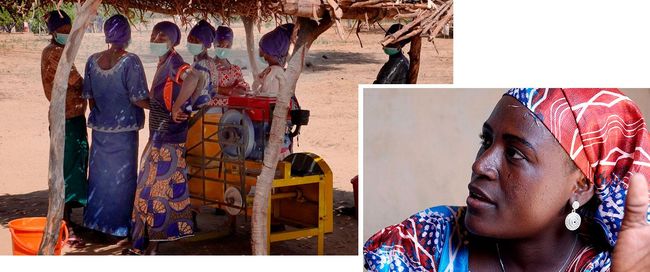
Agricultural training enables young people to implement new activities on their family farms. For example, they learn to plant vegetables during the dry season. In this way, they can help secure and diversify family incomes. The training, which is conducted over two four-month periods, features courses in vegetable gardening, animal husbandry and food processing. Additionally, it includes basic reading and writing as well as various social skills. The training venues are staffed and cared for by local farmer associations. In Niger, these training venues are known as “Sites intégrés de formation Agricole”, or SIFA.
Saliya Oumarou is a trainer at the SIFA in Lokoko municipality. “My day at the SIFA training centre starts at 8:00 a.m. in the morning. Trainees are working in the field, and in the afternoon they attend classes on food processing, animal husbandry, and literacy. Of the 50 trainees, 21 are young women. Later I would like to continue going to school myself and study agronomy. I have decided on agriculture to help my family by working in the field and improve our harvest so that they don’t have to live in poverty”.
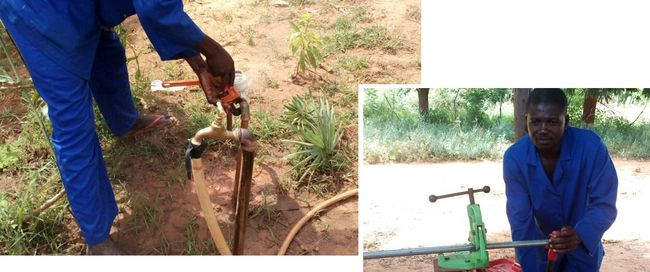
Short courses for young people with no school diploma are aimed at helping them achieve rapid employment. Over four to six weeks, they gain basic technical skills that allow them to earn income as employees or self-employed professionals. The content of the training is based closely on the local context and the desires and needs of young people.
Sahabi Oumarou from Dioundiou fixed water leaks, but he didn’t have a formal qualification. He then completed a training course for plumbers which was organised by Swisscontact. “The training helped me gain new technical skills and discover other services that I am now able to offer. This motivated me to start my own company in 2015. Now I install drain- and supply pipes and repair fire extinguishers and other equipment. I’ve also begun working in agriculture: for example, I set up irrigation systems. I also train my employeesat my workshop.”
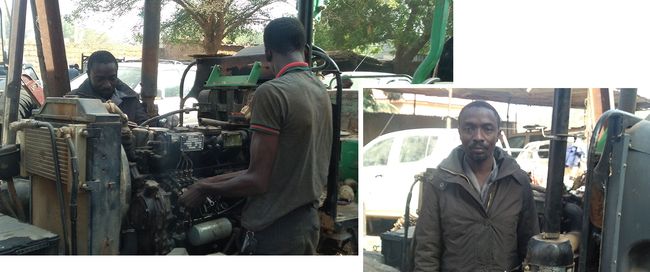
This type of support targets young people who are already active in a particular profession. It is just as flexible and modular in structure as the “Primary skills training”.
Abdoul Aziz Alassane Gaoh (33) from Dogondoutchi works as a tractor driver at construction sites. When construction isn’t happening, he works as an auto mechanic. In order to improve his skills as a mechanic, he registered for a 15-day continuing education course called “Care and maintenance of tractors” organised by the training centre in Doutchi as part of the project. He says: “This training was quite useful to me. Now I’m a professional tractor driver and tractor mechanic. I can now drive my machines and am hired by other businesses for maintenance work.”
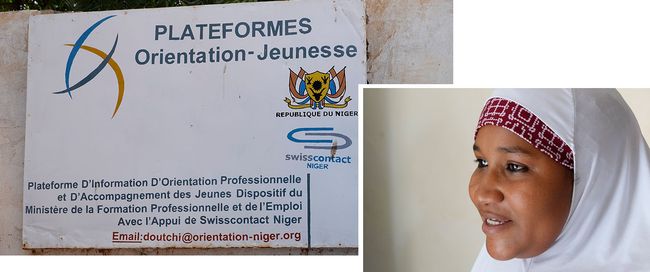
The objective of this advisory service is to inform young people and guide them in laying out their professional plans to finally help them find employment. The service targets young people without stable employment who are in a precarious economic situation, or youth who want to develop a new profession. Through counselling, these young adults gain an overview of the options and services available to them, or else they can learn which sectors are expected to grow. This service is offered through the town administration.
Aminou Oumarou is an advisor at the Doutchi orientation centre. “I worked for the vocational education inspection office and was posted to this orientation centre in late 2017. Initially, I found it a bit boring, but meanwhile I love this job, especially when I am able to help a young person in their search for employment. We often go to the Fada (a youth leisure centre) to raise awareness among young people about what we offer. Some approach me directly when I am around the village and ask me questions.”
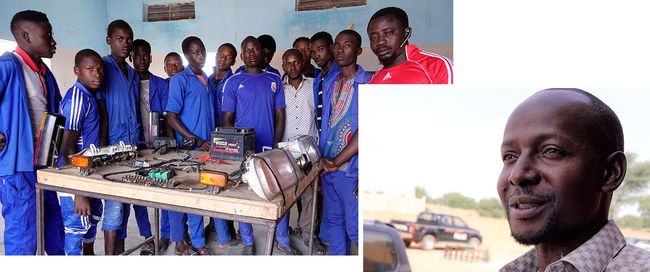
These schools impart basic skills and the qualification to exercise a particular trade during a two-year course. Here as well, alphabetisation constitutes an important component of the coursework. The schools are public and managed by the municipalities.
Yahouza Idrissa teaches aspiring auto mechanics in Doutchi. He himself received training through Swisscontact. “Trainees come here twice a week. They work at a workshop for three days in order to apply what they have learned. Beyond classroom hours I work at a garage to further hone my skills. I’m happy to teach young people a profession that allows them to earn their living.”
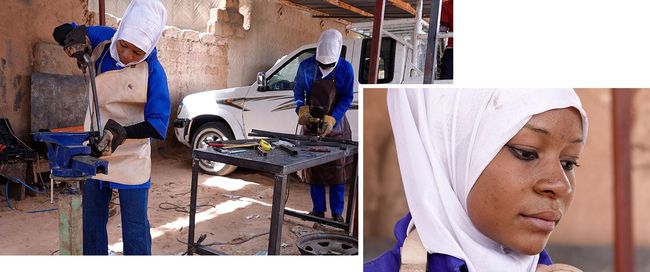
This training allows youth the opportunity to advance as technicians. A condition is that they complete at least one six-month internship at a workshop, with the support of the employer. For up to two years they continue working at the workshop and also take classes at a training centre. These trainings are managed by local trade associations.
After failing her exams, Aïcha Amadou left school and decided to start working in her father’s metal workshop. Many people criticised this decision: this profession is not for girls, they said. Aïcha’s father supported her choice. In 2017, he registered his daughter for a 14-month course at the trade association. She was diligent and highly motivated, finishing her training as second-best in her class. “I can’t find the words to describe how much this training has changed me. And moreover, it is our workshop that benefits. The trust my father has in my work continues to grow. Recently he asked me to take care of the younger trainee apprentices. He is relying on me to take up the reins of his business as his successor.”
Swisscontact
Swiss Foundation for Technical Cooperation
Hardturmstrasse 123
CH-8005 Zurich
Tel. +41 44 454 17 17
Fax +41 44 454 17 97
E-Mail info@swisscontact.org